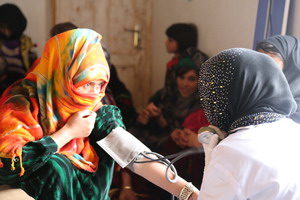 Mobile team provides health services to displaced people. Photo: David LaiKabul, 15 June 2018 – The lives of a million people are critically affected by drought in Afghanistan. Another 2 million people could be affected in the coming months.
Mobile team provides health services to displaced people. Photo: David LaiKabul, 15 June 2018 – The lives of a million people are critically affected by drought in Afghanistan. Another 2 million people could be affected in the coming months.
Food insecurity and reduced access to safe water are beginning to take their toll in the 10 worst affected provinces. Currently, more than 20 000 people have already been displaced to the province of Herat in western Afghanistan from neighbouring provinces due to the drought.
WHO Representative in Afghanistan Dr Richard Peeperkorn stated that, “WHO and health cluster partners have already scaled up activities in response to the emergency."
Afghanistan Health Cluster coordinator Dr David Lai commented that, “Food assistance is being delivered to the affected population, in addition to which humanitarian aid workers are scaling up assistance with a combination of health, nutrition, water and sanitation activities to prevent malnutrition and outbreaks of communicable diseases.”
The Humanitarian Response Plan for Afghanistan has been revised to respond to the emergency.
Working with the Ministry of Public Health and partners implementing the Basic Package of Health Services for Afghanistan, WHO-supported mobile health teams are in place to provide emergency health services in Herat, Sar-e-Pul, Baghis, and Ghor provinces. WHO essential medical supplies in regional warehouses are ready to be deployed as needed, and supplementary immunization activities for measles are planned with national health authorities and partners.
WHO as lead agency for health cluster will continue to complement and support the drought response.


